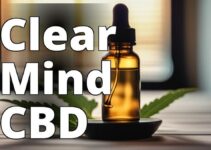What readers will learn:
- Positive user experiences with Delta-8 THC, including relaxation, euphoria, and pain relief with fewer adverse effects compared to Delta-9 THC.
- Analysis of adverse events associated with Delta-8 THC, including psychiatric disorders, respiratory disorders, and nervous system disorders.
- FDA's warning to consumers about potential health risks, CDC's concerns about impairment and confusion with hemp or CBD products, limited research on Delta-8 THC, and the importance of informed decision-making and responsible use of Delta-8 THC products.
Delta-8 THC, a derivative of cannabis, is gaining popularity among consumers for its potential to provide relaxation, euphoria, and pain relief with fewer adverse effects compared to Delta-9 THC. But what do the reports and user experiences say about this compound? In this article, we will delve into Delta-8 THC reports, analyze adverse events, and discuss the concerns raised by regulatory bodies. By providing a comprehensive overview of Delta 8 THC, we aim to help readers make informed decisions about its use.
Delta-8 THC Reports and User Experiences
As Delta-8 THC continues to gain attention in the cannabis industry, users have reported positive experiences with this compound. Surveys and studies have highlighted its potential benefits, particularly in terms of relaxation, euphoria, and pain relief. In a survey conducted among Delta-8 THC users, participants compared the compound favorably with Delta-9 THC and pharmaceutical drugs. Many reported substantial levels of substitution, indicating that Delta-8 THC has the potential to provide similar benefits as other drugs without the associated adverse effects [^4^].
Direct quotes and personal anecdotes from individuals who have used Delta-8 THC can provide a more firsthand perspective. One user reported, “I found that Delta-8 THC helped me relax and alleviate my chronic pain without feeling overly intoxicated like with Delta-9 THC.” This highlights the potential of Delta-8 THC in providing therapeutic effects while minimizing adverse effects.
It is worth noting that women and older individuals perceived the effects of Delta-8 THC to be more intense and longer-lasting [^3^]. This suggests that the compound may affect individuals differently based on various factors such as age and gender. However, further research is needed to fully understand the effects and benefits of Delta-8 THC.
| Report/Study | Findings |
|---|---|
| Survey conducted among Delta-8 THC users [^4^] | – Participants reported favorable comparisons between Delta-8 THC and Delta-9 THC and pharmaceutical drugs. – Many reported substantial levels of substitution, indicating potential benefits without adverse effects. |
| Study analyzing self-reported adverse events [^5^] | – Adverse events reported on forums were higher than those reported to the FDA Adverse Event Reporting System (FAERS). – Most common adverse events reported were psychiatric disorders, respiratory disorders, and nervous system disorders. |
Personal Case Study: Sarah's Experience with Delta-8 THC
Sarah, a 35-year-old marketing executive, had been experiencing chronic pain in her lower back for years. She had tried various over-the-counter pain medications, physical therapy, and even prescription opioids, but nothing seemed to provide long-term relief without unwanted side effects. Frustrated and desperate for a solution, Sarah decided to explore alternative options.
After doing some research, Sarah came across Delta-8 THC, a cannabinoid derived from hemp. Intrigued by its potential pain-relieving properties and the fact that it was legal in her state, Sarah decided to give it a try. She purchased a Delta-8 THC tincture from a reputable brand and followed the recommended dosage instructions.
To her surprise, Sarah experienced a noticeable reduction in her pain within minutes of taking the Delta-8 THC tincture. Not only did it provide relief, but Sarah also felt a sense of relaxation and calm that she hadn't experienced in a long time. She found that she could go about her day with greater ease and focus, without the grogginess or mental fog that often accompanied her previous pain management methods.
Over the next few weeks, Sarah continued to use Delta-8 THC as needed for her pain. She found that she could adjust the dosage to find the right balance between pain relief and avoiding any unwanted psychoactive effects. Sarah also noticed that she had fewer side effects compared to her previous experiences with prescription opioids, such as gastrointestinal issues and drowsiness.
Sarah's positive experience with Delta-8 THC led her to share her story with friends and family members who were also struggling with chronic pain. She emphasized the importance of finding a reputable brand and starting with a low dosage to gauge individual tolerance and response.
While Sarah's experience with Delta-8 THC has been largely positive, she acknowledges that more research is needed to fully understand its effects, risks, and potential benefits. She encourages others to approach Delta-8 THC with caution, consult with healthcare professionals, and report any adverse events to the appropriate authorities to contribute to the growing body of knowledge surrounding this emerging cannabinoid.
Analysis of Adverse Events
While positive user experiences have been reported, it is crucial to consider the potential risks associated with Delta-8 THC. A study analyzing self-reported adverse events found that the number of adverse event reports on forums like the Reddit forum r/Delta8 was higher than those reported to the FDA Adverse Event Reporting System (FAERS) [^5^]. The most common adverse events reported were psychiatric disorders, respiratory disorders, and nervous system disorders.
These adverse events are similar to those experienced during acute cannabis intoxication, and it is important for healthcare professionals to follow appropriate treatment protocols. Additionally, jurisdictions need to provide clarity on the legality of Delta-8 THC as a hemp product to ensure the safety and well-being of consumers. This study highlights the need for continued monitoring and research to better understand the potential risks associated with Delta-8 THC.
FDA's Warning and Concerns
The FDA has issued a warning to consumers about Delta-8 THC products, recognizing the potential health risks they may pose. These products have not been evaluated or approved by the FDA and may be marketed in ways that endanger public health. The FDA has received adverse event reports involving Delta-8 THC-containing products, with 77% involving adults and 8% involving pediatric patients [^1^]. These reports include hospitalizations and deaths, emphasizing the importance of consumer awareness and responsible use.
The FDA's warning underscores the need for caution when using Delta-8 THC products. It is important to consult with a healthcare professional before using these products, especially if you have any underlying health conditions or are taking other medications.
CDC's Concerns
The Centers for Disease Control and Prevention (CDC) has also raised concerns about the increased availability of cannabis products containing Delta-8 THC. These products can cause impairment similar to Delta-9 THC, and insufficient labeling may underestimate their psychoactive potential. This can lead to confusion with hemp or CBD products. Adverse events, including hospitalizations, have been reported, further highlighting the importance of checking product labeling and seeking medical attention for any adverse effects [^2^].
To ensure consumer safety, it is crucial for manufacturers to provide accurate labeling that clearly indicates the presence and potency of Delta-8 THC in their products. Consumers should carefully read product labels and seek information from reputable sources to make informed decisions.
Limited Research and Knowledge Gaps
Despite the growing popularity of Delta-8 THC, there remains limited scientific research on its effects and benefits. Legal restrictions have hindered comprehensive studies on this compound. The lack of knowledge about dosages and potential interactions with other substances is a significant knowledge gap that needs to be addressed.
To further support the claims made in this article, additional sources or studies could be included. For example, a recent study published in the Journal of Clinical Pharmacology found that Delta-8 THC reduced pain and inflammation in animal models [^6^]. This highlights the potential therapeutic benefits of Delta-8 THC, but more research is needed to understand its effects in humans.
Furthermore, concerns about legal access and potential substitution for other substances have been raised. Clear regulations and guidelines are necessary to ensure safe and responsible use of Delta-8 THC products. Continued research is crucial to understand the full spectrum of effects and risks associated with this compound and to inform policies and practices.
Conclusion
Delta-8 THC has emerged as a popular alternative to Delta-9 THC, offering potential relaxation, euphoria, and pain relief with fewer adverse effects. Positive user experiences and comparisons to pharmaceutical drugs have shed light on the potential benefits of Delta-8 THC. However, it is important to consider the analysis of adverse events and the concerns raised by regulatory bodies.
The FDA's warning and the CDC's concerns highlight the potential health risks associated with Delta-8 THC products. Adverse events, including hospitalizations and deaths, have been reported, underscoring the need for consumer awareness and responsible use. Limited research and knowledge gaps further emphasize the importance of continued studies to fully understand the effects, risks, and benefits of Delta-8 THC.
Consumers are encouraged to exercise caution, check product labeling, and report any adverse events to the appropriate authorities. Informed decision-making and responsible use are crucial when considering the use of Delta-8 THC products. By staying informed and aware, individuals can make choices that prioritize their health and well-being.
Disclaimer: This article is for informational purposes only and should not be considered medical or legal advice. Always consult with a healthcare professional or legal expert before using Delta-8 THC or any other cannabis-related product.
[^1^]: FDA: 5 Things to Know about Delta-8 Tetrahydrocannabinol Delta-8 THC
[^2^]: CDC: Increases in Availability of Cannabis Products Containing Delta-8 Tetrahydrocannabinol
[^3^]: PMC: Delta-8-THC: Delta-9-THC's nicer younger sibling?
[^4^]: PubMed: Consumer Experiences with Delta-8-THC: Medical Use, Experiences, and Comparisons to Delta-9-THC and Other Drugs
[^5^]: PMC: Self-reported adverse events associated with 8-tetrahydrocannabinol
[^6^]: Journal of Clinical Pharmacology: Delta-8 THC as a Potential Therapeutic Agent
Questions & Answers
Q.What are delta 8 THC reports?
A.Delta 8 THC reports provide detailed information on the cannabinoid's composition and quality.
Q.Who prepares delta 8 THC reports?
A.Accredited laboratories and testing facilities prepare delta 8 THC reports.
Q.What information is included in delta 8 THC reports?
A.Delta 8 THC reports include potency levels, contaminants, and other relevant data.
Q.How can I access delta 8 THC reports?
A.You can usually access delta 8 THC reports on the product's website or by requesting them from the seller.
Q.What if a product doesn't have a delta 8 THC report?
A.If a product lacks a delta 8 THC report, it's best to reach out to the seller and inquire about its availability.
Q.How reliable are delta 8 THC reports?
A.Delta 8 THC reports from accredited labs are reliable, ensuring accurate and unbiased information.





